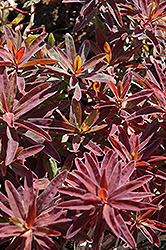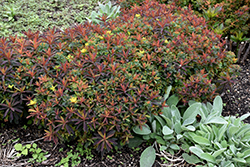Height: 10 inches
Spread: 18 inches
Sunlight:
![]()
![]()
Hardiness Zone: 4a
Other Names: Cushion Spurge
Description:
Mounded perennial has beautiful burgundy summer foliage that contrasts with yellow and chartreuse flowers, brilliant red fall color; adapts to varied soils, deer tend to stay away from it; milky sap can be a skin irritant to humans
Ornamental Features
Bonfire Cushion Spurge has masses of beautiful cymes of yellow flowers with chartreuse bracts at the ends of the stems from mid to late spring, which are most effective when planted in groupings. Its attractive narrow leaves emerge green in spring, turning burgundy in colour. As an added bonus, the foliage turns a gorgeous red in the fall.
Landscape Attributes
Bonfire Cushion Spurge is an herbaceous perennial with a mounded form. Its medium texture blends into the garden, but can always be balanced by a couple of finer or coarser plants for an effective composition.
This is a relatively low maintenance plant, and should only be pruned after flowering to avoid removing any of the current season's flowers. Deer don't particularly care for this plant and will usually leave it alone in favor of tastier treats. It has no significant negative characteristics.
Bonfire Cushion Spurge is recommended for the following landscape applications;
- Mass Planting
- Border Edging
- General Garden Use
- Container Planting
Planting & Growing
Bonfire Cushion Spurge will grow to be about 10 inches tall at maturity, with a spread of 18 inches. It grows at a medium rate, and under ideal conditions can be expected to live for approximately 10 years. As an herbaceous perennial, this plant will usually die back to the crown each winter, and will regrow from the base each spring. Be careful not to disturb the crown in late winter when it may not be readily seen!
This plant does best in full sun to partial shade. It is very adaptable to both dry and moist growing conditions, but will not tolerate any standing water. It is considered to be drought-tolerant, and thus makes an ideal choice for a low-water garden or xeriscape application. It is not particular as to soil pH, but grows best in sandy soils. It is highly tolerant of urban pollution and will even thrive in inner city environments. This is a selected variety of a species not originally from North America, and parts of it are known to be toxic to humans and animals, so care should be exercised in planting it around children and pets. It can be propagated by cuttings; however, as a cultivated variety, be aware that it may be subject to certain restrictions or prohibitions on propagation.
Bonfire Cushion Spurge is a fine choice for the garden, but it is also a good selection for planting in outdoor pots and containers. It is often used as a 'filler' in the 'spiller-thriller-filler' container combination, providing a mass of flowers and foliage against which the thriller plants stand out. Note that when growing plants in outdoor containers and baskets, they may require more frequent waterings than they would in the yard or garden.
Disclaimer - This resource is provided for informational purposes only and does NOT reflect current availability. Inventory varies seasonally, so we cannot guarantee that every plant will be in stock at all times - please contact your favourite GardenWorks location directly for current availability. It does not include our entire inventory of plants, so be sure to visit GardenWorks to see varieties that may not be represented on this list.


